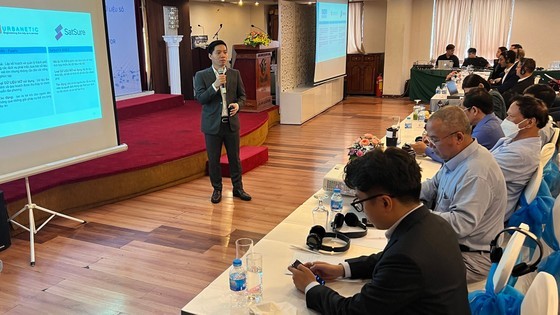
Commenting on the connection between state agencies, departments, and local authorities now that the shared databases are in use, Deputy Director Vo Thi Trung Trinh first mentioned the formal website address of the city’s information portal at https://data.hochiminhcity.gov.vn.
The accessible databases here include electronic version of official documents and information on businesses and household businesses, secured transactions, house use right or land use right registration, hospitals, job certificates, schools and universities, educational services, foreign investment projects, public investment projects, market prices of essential commodities.
DoIC is launching a virtual assistant service to aid officials to use these databases effectively for administrative procedure completion.
Explaining difficulties arisen during the first development stage of these databases, Deputy Director Trinh shared that some content has not been done owing to negative impacts of the Covid-19 pandemic. However, the civil status database has been finished at the end of 2021, and the 1/2,000 and 1/5,000 geographic foundation databases will be completed this July. As to the population and citizen ID card databases, HCMC Public Security Department is working with DoIC to form a technical link for the tasks of identification and authentication, which will also serve the digital transformation task of the city in the future. HCMC Local Government Service Platform (HCM-LGSP) has been basically done for the ease of data sharing.
The Deputy Director then introduced initial achievements of this database exploitation as well as new programs to be launched this year. In particular, HCMC is the first in the country to fully digitize civil status data and upload onto the common database of the Justice Ministry. Over 11.7 million civil status profiles were digitized and synchronized with the database of the Justice Ministry.
Since June 15, 2022, the city has piloted providing extracts of civil status documents to its residents, regardless of registration or storage location. This is the foundation for the implementation of digital data to boost digital transformation and better service offering. In the last quarter of 2022, applications to exploit the shared geographic data in the fields of land management, urban management will be introduced.

More importantly, these databases aim at serving the project ‘Transforming HCMC into a smart urban area’ by allowing the access from the three pillars of the Operation Center for Smart Urban Area, the Center for Socio-Economic Simulation and Forecasting from the fourth quarter of this year, when necessary information is fully integrated.
HCMC is working with World Bank to develop a data strategy for the city from 2022-2025, with a vision to 2030. This means the city clearly understands the necessity to introduce a data administration strategy to serve the Smart Urban Area project and Digital Transformation project more effectively. The shared databases should be managed and exploited based on the three fundamental data types of citizens, businesses, and spatial data, while the city’s open data ecosystem should be formed.
























